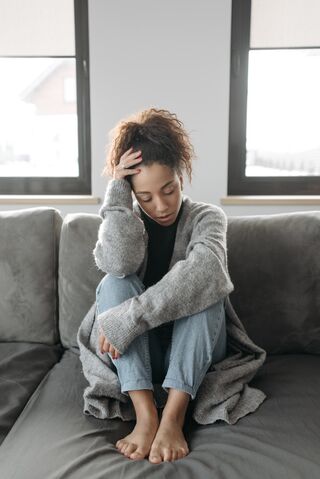Stress
Why Do I Have More Migraines on the Weekend?
Post-stress migraine and change in routines affect migraine attacks.
Posted February 13, 2021 Reviewed by Abigail Fagan

I’m not able to do much of anything today, a Saturday, despite my great plans for catching up on my grading, housework, and writing. I feel like my body is weighted down.
I can't stop yawning, my scalp is tight, my neck is bothering me; even my face is tender, and my eyes are nearly closed. I’m moody, beyond exhausted, barely able to put one leg in front of the other. Now, the headache hails.
And it’s a Saturday.
I had a hectic week with work, lots of student papers to grade, meetings, doctors’ appointments, as well as ones at the veterinarian for my dogs; it was a stressful week, but I relaxed last night and slept in this morning until 8 a.m. I have nothing I absolutely have to accomplish today, so why am I getting a fierce migraine attack and feeling so unwell?
Why Are We So Susceptible to Migraines on the Weekends?
Well, as it turns out, many of the reasons I just mentioned for not thinking I should have a migraine today are the very reasons I do. I should know now, since this pattern has been with me for many years.
Post-Stress Migraine
Since high school (I’m now 57), my attacks often happen after the stress is over, not during the nerve-wracking time, itself. Paula Dumas, an expert on migraine, tells us, “Migraine sufferers who experienced reduced stress from one day to the next are at significantly increased risk of migraine onset on the subsequent day, according to a new study conducted by researchers at the Montefiore Headache Center and Albert Einstein College of Medicine at Yeshiva University” (Dumas).
It's important to note, too, that this stress can be positive or negative; that’s one reason we often succumb to migraine after Christmas, after an exciting event, or even an upsetting one.
Disrupted Sleep Patterns
Let’s say I have to wake up at 6 a.m. every weekday to get the kids ready for school and myself ready for work. Don’t I owe myself a couple of extra hours on the weekends by getting up at 8 a.m. or so? According to The Migraine Trust, “Lack of sleep is a well-known trigger, as is too much sleep (such as lying in at the weekend). Similarly, shift-work and jet lag have been reported to be triggers in some individuals, suggesting an influence of both sleep and the circadian timing system. Excessive sleepiness may be part of the premonitory phase before a migraine attack, or a symptom following the attack” (The Migraine Trust).
Changes in Routine and Schedules
Any migraine sufferer knows that maintaining routine is critical to trying to control migraine attacks. You likely have a different weekend routine than you do throughout the week—different eating/ drinking habits (eating out more, eating fewer healthy foods, maybe an extra cocktail or two), and may even take your maintenance, preventative medications at different times than you do during your week, exercise more or less, and change your hydration patterns, as well.
As I reflect on my Saturday, realizing how little I was able to accomplish or enjoy, I’m going to take expert advice and work, on future weekends, to control the factors I can. Maybe next weekend, I won’t sleep in and, therefore, will take my medications so late the next morning. Also, I will make attempts, where I can, to balance my stress more through the week, and pay closer attention to other major shifts from my daily to weekend routine.
How will you anticipate and, hopefully, prevent next weekend's migraine attack?
References
Dumas, Paula.“The Day After: Study on Stress, Relaxation, and Migraine," Nov. 2018 Migraine Again. https://www.migraineagain.com/the-day-after-new-study-stress-relaxation…. Accessed 13 February, 2021.
“Sleep and Migraine: Reluctant Bedfellows." The Migraine Trust.
https://www.migrainetrust.org/living-with-migraine/coping-managing/slee…. Accessed 13 February, 2021.


